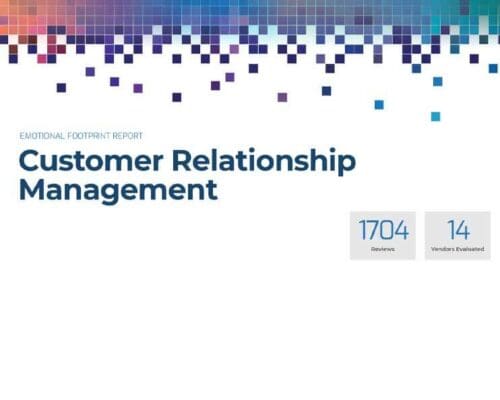Are you feeling overwhelmed by the number of CRM solutions at your disposal? If so, you’re not alone. Countless customer success teams struggle to make sense of their ever-growing list of tools and platforms for managing customer relationships. The result can be a failing CRM strategy that does not meet their needs or provide desired results.
In this blog post, we’re going to go over why your CRM strategy might be falling short and what steps you can take to get it back on track. Keep reading to learn more about the four primary reasons why a business’ CRM strategy may fail—from mismatched software implementations to inadequate data collection.
1: You’re using multiple CRM solutions
If you’re using multiple CRM solutions, such as CRM suites, marketing automation software, and spreadsheets, you may find that they don’t always meet the specific needs of your customer success team.
In a recent report by Forrester, titled Customer Success Teams Fail To Reach Their Potential Without Purpose-Built Technology, they found only a small amount of organisations provide their customer success teams with purpose-built solutions.
Instead, most companies combine several CRM solutions without much implementation or integration.
For example, while CRM suites are great for sales teams, they provide little value for managing customer relationships after the sale. Marketing automation software can be effective at promoting communication and selling, but they need to be built to manage relationships. Meanwhile, the flexibility of spreadsheets can quickly become problematic and lead to errors.
Ultimately, it’s important to find purpose-built solutions that meet the unique needs of each team, ensuring that your customers receive the best possible experience.
2: You’re not managing the entire customer journey
If you’re solely managing transactional stages of the customer journey, you’re missing out on a crucial aspect of customer success: understanding and anticipating complex customer needs.
While CRM and marketing automation software may provide a linear, uniform buying journey, this approach hinders your ability to track and adapt to changing customer needs over time.
At redk, we help businesses gather a complete view of their target customer so they can make the most of every opportunity. Sales performance optimisation means managing long-term customer health so you can cultivate trust, identify opportunities, and help customers gain value across the entire lifecycle.
Kristi Faltorusso, Chief Customer Officer at ClientSuccess, told Forrester: “These tools have their strengths and a lot of data, but they lack the ability to tell a cohesive story past the point of purchase.”
So, by broadening your focus and overlooking the entire customer journey, you can ensure long-term success for both your customers and your business.
3: You lack relevant data collection
In today’s business world, it’s not enough to simply collect data. You need relevant data that tells you what’s happening and what could happen in the future. This is where customer success platforms come in.
Unlike traditional CRMs and MAPs, these platforms deliver deep insights that allow customer success managers to identify friction points and deliver an exceptional customer experience.
The redk team can help your business turn customer data is different customer journeys, personas, and segments with a little marketing automation. Customer success managers can track milestone progress during onboarding, monitor product usage and feature adoption, build success plans, and assess customer health.
Without this information, managers are left to make educated guesses based on limited and disparate data, which can lead to missed opportunities and frustrated customers. It’s time for companies to invest in the tools their customer success teams need to thrive.
4: You need to customise your CRM software
When it comes to customising your CRM software, it’s important to consider the potential drawbacks. While it’s tempting to create a bespoke solution that perfectly fits your customer success needs, the reality is that this can be a time-consuming and expensive process.
Forrester found that companies often end up spending more on integration work than they save in efficiency gains, and too much customisation can lead to maintenance and update issues down the line.
Customisation isn’t always the answer, and it’s important to balance your desire for a tailored solution with the practical realities of cost, time, and maintenance.
5: Your strategy focuses on technology
Technology has become an integral part of modern business and for a good reason. However, when it comes to CRM strategy, is it possible to put too much emphasis on technology? Sadly, when technology takes centre stage, the importance of human interaction can sometimes be forgotten.
When building a CRM strategy, ensuring that your customer service team is given the time, resources, and training to provide outstanding service is essential. After all, creating a trusting and seamless experience for your customers goes far beyond just having the right technology in place.
By putting the emphasis back on your customer service team, you can create a winning formula for success that leads to happy customers, increased loyalty, and, ultimately, improved business growth.
The redk approach
Finding a CRM solution that works for your team is critical to any business. The right solution can help you build a positive customer experience that welcomes new opportunities and growth.
Combining different CRM solutions can help you meet the needs of every department in your company, from sales or data handling. However, the implementation and integration of these different solutions can make or break the entire system.
A great example of this is our work with the PSN Group, an insurance company for university professionals. The redk team implemented a hybrid suite of CRM solutions with different technological components. We needed the omnichannel marketing platform, Acoustic, SugarCRM to manage customer relationships, and Zendesk to manage customer service.
With our expertise and focus on implementation, the PSN Group was able to onboard all three solutions effectively and successfully. The result? The PSN Group was able to grow and expand steadily within Spain’s insurance market.
Talk to us to find out what we can do to add value and drive growth at your organisation.










